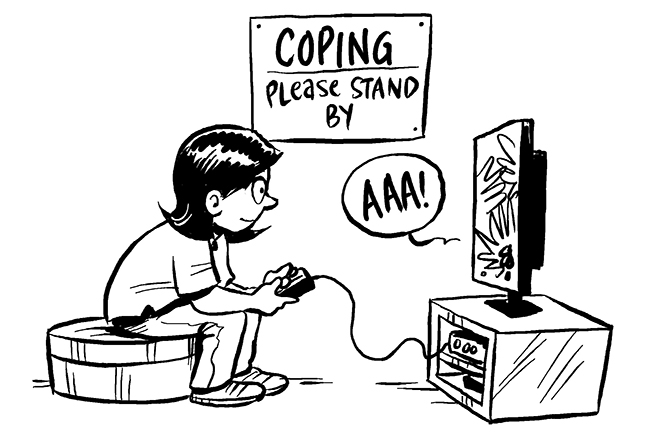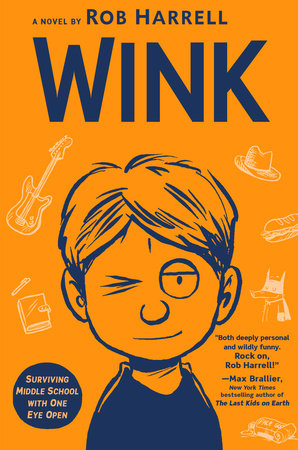Helping Your Kids Find Healthy Coping Skills
by Rob Harrell
I should start out by saying that I’m not a parent or a child psychologist. But what I am is a good coper. World-class, really. So maybe that gives me a leg to stand on.

I’ve had a lot of practice. I dealt with a really awful cancer diagnosis, multiple surgeries, eight weeks of radiation, and eventually lost my sight in one eye. It’s the basis of my new middle grade novel, Wink. I gave Ross, the main character, two of my top coping mechanisms to help him get through it: art and music.
When I went through my “rotten time,” I was doing my daily comic strip, “Big Top.” Sitting down every day to write and draw something funny helped – it helped a lot. So Ross in my book has a sketchbook where he draws the adventures of Batpig – and you can see him working through everything he’s going through in those comics.
Also, while I retreated into my iPod and countless playlists (one for chilling, one for when I was mad, one that was upbeat enough so I wouldn’t fall asleep in my radiation sessions), for Ross it’s guitar. What he doesn’t pour into his sketchbook gets worked out through playing guitar, and a new love of music. Sometimes, what we need is a way to step away from our problems – even if it’s just for a moment.
But coping isn’t just for the seriously ill. There are endless reasons for a kid to hone their coping skills: navigating social aspects of school, tests, puberty, Illness, family stress, financial stress, bullies, popularity, identity, that weird square pizza they serve at lunch that tastes like it has French dressing instead of pizza sauce, and so much more.

But how do you get your child to choose a healthy coping skill? How do you encourage them?
It’s a bit like choosing a college. Am I going to major in Creative Undereating? Mindless Hours with YouTube Videos? Advanced Sullenness? Or maybe something a bit more productive like Learning an Instrument? Obsessive Reading? Artwork? Good Old Physical Activity? Volunteering?
There are a lot of options out there for kids, and one of the most important things is to listen to them and what they want and need. If your kid is a quiet creative type, you may not get far signing them up for Little League – even if that’s what got you through. We’re all different in all kinds of amazing ways, and our methods of dealing with stress should be, too.
Let me also say that my definitions of ‘healthy coping skills’ vs ‘unhealthy coping skills’ are pretty loose. For example, I think zoning out and blowing stuff up in a videogame can be incredibly cathartic, so long as it doesn’t take over your life. I read my Mad magazines over and over – something my parents were really unsure about – but it got me into reading, and comics, and eventually writing. So sometimes… the heart wants what it wants.

On the flip side, something that’s deemed ‘healthy’ can go too far. Physical activity is a great example. Taking up jogging – good. Running instead of doing schoolwork, socializing, and eating – bad.

The most important piece of advice I’d give is to listen. Be open. Be flexible. I know that’s three bits of advice, but you know what I mean. Each kid is different and will deal with difficulty differently. School can be insanely stressful, and I think sometimes adults – caught up in bills and family stuff and work and the Home Owner’s Association – can forget that.
So, go easy, be open, and when you see them happily smashing random stuff in some game called SuperDestroyBoomCrush, maybe you cut ’em some slack. That smile on their face is a pretty good barometer that they’re not in high stress mode. And though you may think they’re ‘wasting their life on that couch,’ they just might just be engaging in some serious Cope Time.


